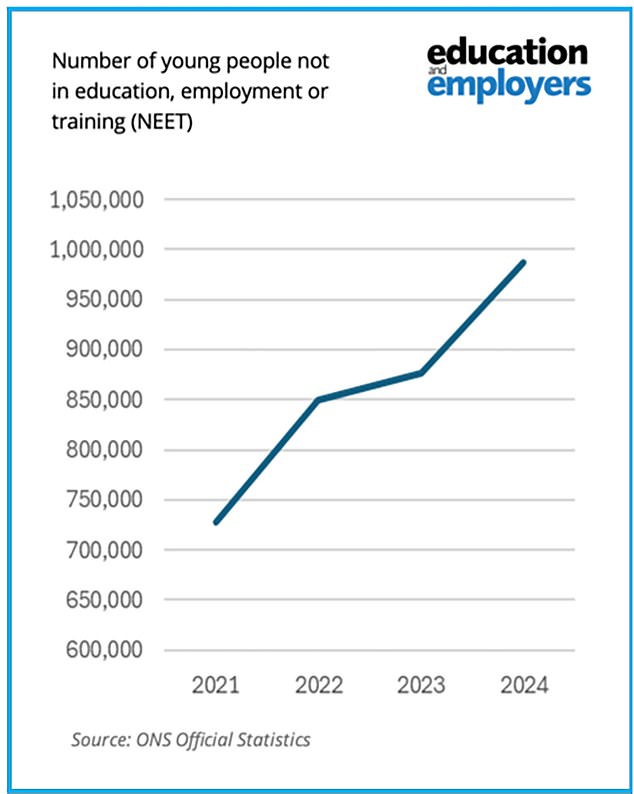
Britain’s young people are in danger of becoming a ‘lost generation’ as they show little interest in pursuing skills-based jobs and instead dream of being the next TikTok or Instagram influencer, an education charity has warned.
The dire projection comes as a major new report highlights the mismatch between young people’s career aspirations and the types of jobs available.
The Organisation for Economic Co-operation and Development’s (OECD) study, titled ‘The State of Global Teenage Career Preparation’, reveals that while jobs in digital, computing and data science have grown rapidly since the year 2000, young people are not willing to meet the demand.
In the UK, the study found that 46.4 per cent of young people are uncertain about their career options – a rise from 24.6 per cent in 2018.
It also revealed that students’ job plans focus on a small number of predominantly professional occupations which compare poorly to actual patterns of employer demand ‘
50 per cent of 15 and 16 year olds who do have more career aspirations are interested in only 10 jobs – either becoming a lawyer, doctor, performer, teacher, police officer, engineer, nurse, vet, architect or working in sports.
Alarmingly, large numbers of young people want to pursue careers as social media influencers and sports stars where the chances of succeeding are very slim.
A recent study by education and employers found 35% of children aspire to careers in culture and media but only 1% of projected jobs are in those areas.
Official figures for the UK from the ONS show there are almost 1 million (987,000) young people not in education or employment (NEET) – the highest figure in over 10 years.

ONS statistics show a sharp increase of young people not in education, employment and training
However, at the same time employers are struggling to recruit, leaving the UK facing a skills shortage and creating a reliance on overseas recruitment for jobs such as biological scientists, bricklayers, care workers, carpenters, graphic designers, laboratory and pharmaceutical technicians and roofers.
Nick Chambers, CEO of Education & Employers charity, said: ‘We need urgent action today to secure growth and full youth employment tomorrow.
‘This means immediately scaling up our efforts to help young people see what they can be.

Many 15 and 16 year olds in Britain and abroad aspire to ‘jobs’ where they have slim chances of success – including becoming social media or sports stars
‘Our charity’s mission is to ensure that every young person in our country, wherever they live, whatever their parents’ or carers’ circumstances, can meet a diverse range of volunteers to hear first-hand either in person or virtually about jobs and the world of work.
“This can be done quickly and easily, and swiftly scaled to cover millions of young people through initiatives such as our ‘Inspiring the Future’ programme, where a volunteer from the world of work simply chats informally to pupils either in primary or secondary schools, inspiring them about their job and career journey.’
Over 452,000 children and young people every year are meeting and chatting with people from the world of work through the Inspiring the Future platform.
While 92,000 people have registered as volunteers together with 12,500 primary and secondary schools.

Research shows that getting young people to meet with employers can inspire them to seek meaningful training and employment
It has already enabled 4,950,000 interactions between young people and people from the world of work.
Education & Employers is seeking support to massively expand this reach so that every young person can hear from a career role model.
Mr Chambers added: “As a matter of urgency, we want to increase from just under 0.5 million a year children and young people to 1 million and then to 5 million.
“Now is the time for action to guarantee that our young people fully understand the opportunities open to them and that we have the future workforce we need to ensure a vibrant and prosperous economy and society for years to come.”





